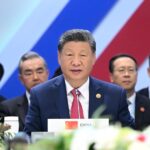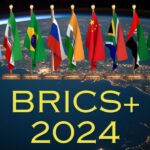BRICS is one of the organizations that has rapidly expanded its influence on global political and economic fronts. In late 2024, the 16th summit of BRICS began in Kazan, Russia, marking an important event for exploring new avenues of cooperation and change in global politics and economics. BRICS, recognized as a framework for interaction and cooperation between emerging and developed markets, has now become a significant force for exchanging and advancing economic and political power, especially for its member countries and the Global South.
So far, BRICS has extended membership to Egypt, Iran, Saudi Arabia, the United Arab Emirates, and Ethiopia, increasing the organization’s members from five to ten. This expansion highlights that many nations are dissatisfied with the traditional global order and are looking to join alternative structures like BRICS. According to reports, over 30 other countries, most of which are from the Global South, have also applied to join the organization.
BRICS’ cooperation mechanism plays an active role in various economic and social sectors. Financially, BRICS has established two major institutions: the New Development Bank and the Contingent Reserve Arrangement. These financial institutions support infrastructure projects in BRICS member countries and other emerging markets, aiming to reduce poverty, sustain growth, and ensure the equitable distribution of resources. BRICS’ multi-sectoral cooperation framework spans agricultural technology, innovation, cultural and educational collaborations. For instance, agricultural cooperation between China and Brazil has increased Brazil’s agricultural exports to China and strengthened the foundation for artificial intelligence and green development in Brazil.
The primary goal of BRICS is to create a system of global cooperation, development, and balanced economic growth, while also providing an alternative to the economic and political dominance of the West. BRICS member states are working to secure their national independence and economic growth through cooperation, and to claim their rightful place in the global system. This aspiration resonates with nations tired of Western dominance, and many see hope in BRICS.
Chinese President Xi Jinping, during the 15th BRICS Summit in South Africa last August, emphasized that BRICS is a crucial force in shaping a new global vision. He stressed that BRICS member countries are charting their paths toward global development and achieving their shared goals. BRICS has now created a comprehensive cooperation framework that helps safeguard the national interests of its members and plays a key role in maintaining global peace and stability.
BRICS’ cooperation is not limited to economics; it also extends to social and cultural collaboration. Through cultural exchanges, BRICS member countries can understand each other’s cultural and historical heritage, fostering mutual respect and progress. BRICS’ initiatives in culture, education, and healthcare are also noteworthy, making the organization a broad platform for cooperation across various fields.
BRICS represents a great opportunity not only for its current members but also for those aspiring to join the organization. The cooperation fostered by BRICS has gained global support as an alternative path to achieving international peace and development. The 16th BRICS Summit marks a new chapter for the organization and serves as an important step toward strengthening multilateralism for global security and prosperity.
In the future, BRICS can continue playing a vital role in balancing the global economic system and advancing global justice. The 16th BRICS Summit, being the first after the organization doubled its membership, will further increase its influence in global politics and economics.
Now more than ever, BRICS plays a pivotal role on the world stage, as efforts to achieve global peace and justice continue. This organization is seen as a beacon of light and a significant force for justice and stability in the world.













